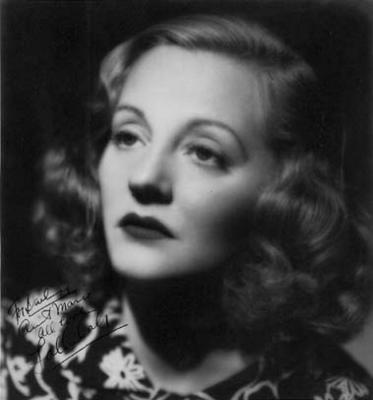 Joel Lobenthal’s biography of Tallulah Bankhead has no time for Miss Bankhead’s legendary cult status as gay icon. At various stages in the book the author describes Bankhead’s legions of gay fans as misogynists and saboteurs. It’s as if Susan Sontag’s famous Notes on Camp had never been written, in which Sontag lists Tallulah Bankhead as one of ‘The great stylists of temperament and mannerism.’ Sorry, but Sontag’s description of camp seems like praise to me. By doggedly refusing to discuss Tallulah’s camp appeal, this book loses any possible zest it may have possessed.
Joel Lobenthal’s biography of Tallulah Bankhead has no time for Miss Bankhead’s legendary cult status as gay icon. At various stages in the book the author describes Bankhead’s legions of gay fans as misogynists and saboteurs. It’s as if Susan Sontag’s famous Notes on Camp had never been written, in which Sontag lists Tallulah Bankhead as one of ‘The great stylists of temperament and mannerism.’ Sorry, but Sontag’s description of camp seems like praise to me. By doggedly refusing to discuss Tallulah’s camp appeal, this book loses any possible zest it may have possessed.It’s a pretty big book, over 500 pages. As far as I can tell, the book’s aim is to make a ‘serious’ appraisal of Tallulah’s career and definitively slot her somewhere into the history of film and stage. Lobenthal wants to give Tallulah the dignity that he feels her icon status denies her. The result is a sluggish book. It has some moments, but they are the sections where Tallulah thankfully does most of the talking.
The most boring parts are all the theatre descriptions and names, names, names of people I’ve never heard of before. The plots of dull, second rate plays are also summarised in unnecessary detail. Who cares? You’d have to be a theatre aficionado of the time to really enjoy all the talk about these forgotten directors, writers and actors.
I noticed one glaring error in the text. On page 154 Lobenthal describes actor Harry Kendal being glimpsed in the Hitchcock film Young and Strange. No such film exists. He’s obviously mixed up either Hitchock’s Rich and Strange (a line out of one of Shakespeare’s sonnets) or Young and Innocent. I don’t know which. Such muddle headed scholarship is a bit of a worry. Who knows what other errors there are in the text?
I only finished this book because of Tallulah. In the early fifties she wrote her own autobiography – or rather dictated it to a ghost writer. No doubt she could have written it herself. She was a huge reader. (She found Proust ‘a bit excessive’, finishing his long novel out of a sense of intellectual duty). I sense her autobiography would be full of pithy, sharp as a tack observations, like Lucille Ball’s wonderful memoirs.
Let’s leave the last words to Tallulah Bankead herself, from the above mentioned autobiography:
‘If I have my history right, it is the heretics, the nonconformists, the iconoclasts who have enriched our lives, added both to our knowledge, our progress, and our happiness.’
No comments:
Post a Comment